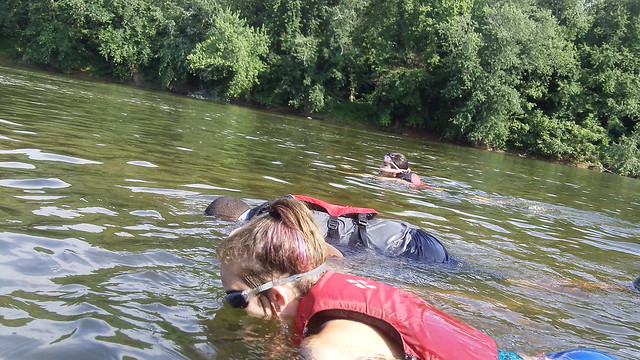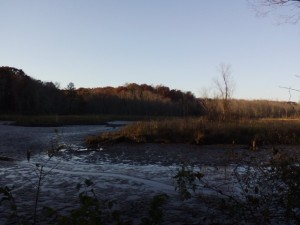In my last synthesis blog, I discussed how joining Earth Lodge brought me back to my “Nature Girl” roots. Now I’m the lady in a ditch, but I am noticing the little things of the natural world around me that I didn’t before. As I dug into my previous blogs looking for the underlying concepts or themes, this whole idea of noticing thing that I hadn’t before kept popping up in all of my other blogs. In “Two Rivers” I explain how I’ve lived all my life near the Potomac yet never realized just how far gone it was from healthy. My two reflection spot blogs, “Another Look” and “Little Things” probably say enough in just their titles; they are both about finding the hard-to find. While we want to link our blogs together for a synthesis entry, at this point I was starting to worry. How did I manage to write all of my journal entries with a basic theme of the same subject? How did I not notice before? Sure there were other concepts present in my writings, but I really hope my mind isn’t quite that unimaginative. I didn’t want to write another blog entry on this topic, because it seemed to me like I wasn’t synthesizing at this point, but just repeating myself.
Once I read my Community-Based-Learning Entry, though, did I figure out the real concept that linked together all of my entries. Learning. This blog talked about the links between our out-of-class service and our in-class curriculum. Cleaning up Huguenot Flatwater, I kept seeing debris and thinking of how they got there due to an increased number of impervious surfaces. Working at William Byrd Community house, I pondered the farm-to-table connection that the owners are fostering in these children. While my other blogs to talk about noticing the previously unnoticed within nature, this one made it clear to me why the concept kept coming up, and what was significant about it. But let me keep you in suspense for just a little longer.
If I accidentally wrote about the same concept of ‘noticing small things’ multiple times, I think that it is same for us to assume it’s a pretty important idea. Well, at least it is to me. But why is it important? I didn’t keep writing about it for no reason. You probably know, but I’ll give you a hint; it’s the same reason everyone only used Forsyth’s Awareness-Appraisal Model in their project proposals. This is the most important concept; awareness. Because in the end, awareness of something leads to caring about that thing. You know what they say; the first step is admitting you have a problem. If I notice the little things about the environment around me, that means I’m going to start caring about these little things. Eventually, these little thing stack up, cause it’s only when all the smaller portions come together can the big picture be made. Only when the debris is out of the water can the sturgeon population be back. When we start seeing water that can really support sturgeon, then we’ll see water that can hold oysters. When the oysters come back, maybe the James and the environment will really have a chance to succeed.
Now this is all inspiring and lovely, but we’re missing something important. So let me get back to our topic from before: education. The reason why noticing small things is important is because it gets you to care. Then caring about small things becomes caring about the big things. But you can never really notice or care unless you’re educated on these things.
I never would have noticed the debris on the water if I hadn’t learned to look for it. Nor would I have realized that the debris was a problem if I hadn’t been taught all about impervious surfaces. When I wrote in my community-based learning blog about the farm-to-table connection, the education really is the critical aspect. We heard all about how that area is a “food desert,” with no real access to groceries for many residents with limited money and transportation options. Additionally, it provides fruits and vegetables and other healthy options which are normally more expensive and harder to access. If the children were not taught about the food they were growing, they would never know why growing that food was important, and never value it or try to protect it. With this added educational aspect, both the volunteers at William Byrd and the former students of William Byrd are informed enough to work to protect this ability to grow food. Volunteering at William Byrd I thought about how many people have never seen where their food comes from before, so this link is so important.
You want to know why this guy is happy? He knows where his food is coming from!
In my blog entries, I wouldn’t have noticed the small details of my little ditch without learning about them first. It would have never occurred to me to note the little insects around, or the tiny fish in the water. Now, I look because I know they are a sign of the health of the water.
The one example that I find most powerful is part of my “Two Rivers” blog entry. I wrote about how we measured the turbidity of the Potomac, which gave us very poor results. I talked about how I had never in my life seen water as clear as the target amounts we were given. I, as well as many others, probably just assume that things are mostly how they are supposed to be. Without knowing any better, you’d never imagine how wrong your perceptions can be.
Without being a member of Earth Lodge, I don’t think I would have ever really gone to the James River much. Before taking this class I didn’t know about all the great things that the James River has to offer, and how varied and interesting the units of the James River Parks System are. Now, I have a running list of all the things I want to do in the City of Richmond, and I plan on going to the river as much as possible. I know so much about this environment, the city, the parks, and the James. Now I want to enjoy it, and hand in hand with that comes my desire to protect it. Hey, I guess knowledge really is power.

Like really, how could you not want to go snorkeling one you knew you could (right in your backyard)?

